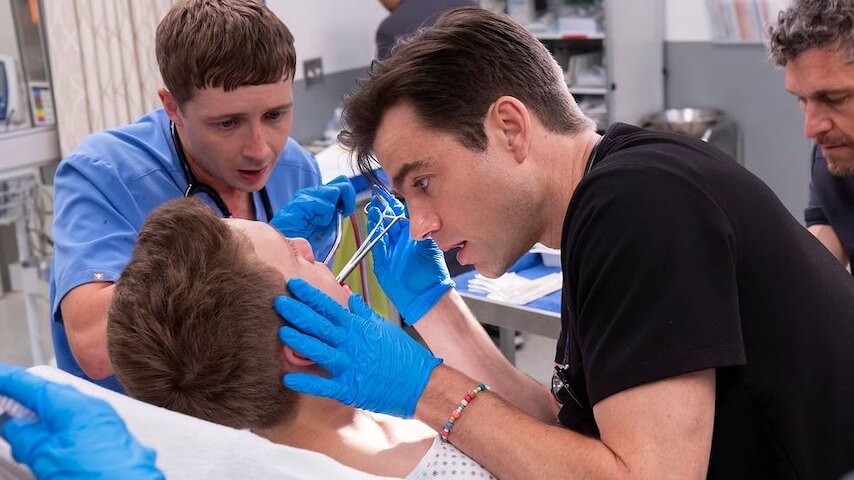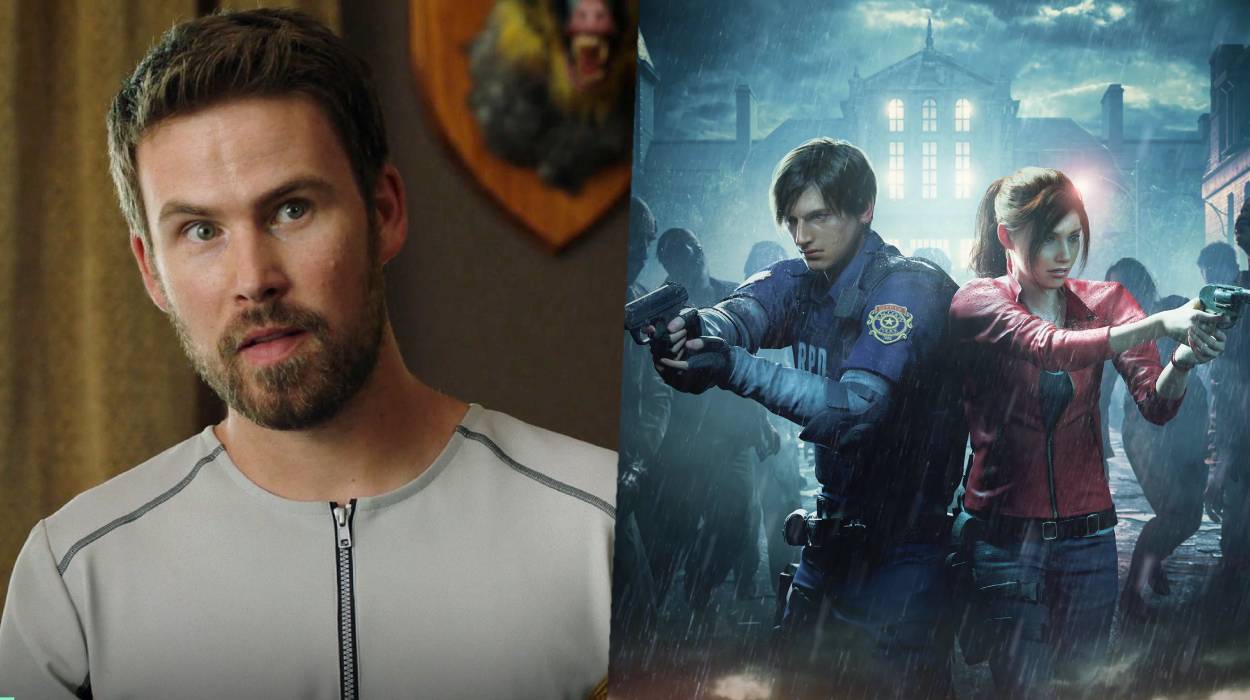The Pitt is still leaving some of its characters in the cut
That said, the medical drama does nicely drop some sly gallows humor.


Being an emergency-room physician is all about making choices. In a frenzied moment when the angels of life and death dance on the head of a pin, a certain medicine at a specific dosage in a very particular way can make all the difference. And The Pitt certainly has its share of heightened life-or-death moments—in this episode alone, there are at least two—but the 11 a.m.-to-noon hour is also about the choices made on a smaller, more intimate scale that can have dire consequences of their own.
The episode begins with a man, who began seizing in the massively crowded hospital waiting room, being rushed back and Doctors. Langdon and Santos go pedal-to-the-metal to save him. Langdon knows that a certain medication, delivered correctly, can bring the man back, but Santos militantly insists that her approach is right—so much so that when she has problems opening a vial, she blames the way that vial is sealed.
Understandably, Landgon has had more than enough of being second guessed by his trainee, delivering another kind of medicine, that of blunt feedback, about her arrogance. As the ER Ken, Patrick Ball still hasn’t been given much to do, other than be jocular and charming or adopt a big-brother sternness whenever either option suits the narrative. His talent and popularity around the ER, along with that nickname, suggests that he might have been a hotshot like Santos before he endured a necessary humbling. Perhaps he’s choosing to prevent a similar fate for her at a patient’s expense.
Perhaps is the key word here, since Langdon has yet to be defined in any meaningful way. Santos certainly has more clarity even if—so far—she’s a brittle asshole who is becoming increasingly tedious to watch. This is no slight to Isa Briones, who is fighting for her life to give her character some depth: In the moment where Santos asks a colleague for input about potentially reporting Langdon’s supposed misconduct to Robby, Briones shades some genuine concern into her expression.
But micro-expressions and careful tones of voice can’t completely revise flat writing, and Santos is mostly back to her baseline of mocking her peers. In this episode, poor Whitaker takes the sharp end of her tongue when she teases him about needing to change into another pair of scrubs after a wound debridement goes south. In this hour, Whitaker, still traumatized by losing his first patient, must confront his freeze response, starting with the aforementioned wound debridement. Gerran Howell expertly deploys his hangdog eyes as Whitaker looks to Mohan for approval while he tries to clean a wound attached to an adventurous bicyclist.
For all of its struggles with fully developing its characters, The Pitt does excel at crafting a sly gallows humor that wouldn’t be out of place in an actual ER. The wound bursts in a geyser of hot blood, causing Whitaker to panic. Dr. King swings into the rescue, and the patient wants her, Mohan, or anyone else to take over. The farm boy will get a redemption of sorts later in the hour, when a teenager whose routine tonsil removal, done at another hospital, becomes that dance between life and death.
As Robby, Langdon, and Whitaker try to save the boy, who is choking on his own blood, Whitaker tremulously exclaims that he’s going to lose another patient, prompting Robby to tell him to please shut up. It seems to snap some verve back into Whitaker, because, after his calls to the head and neck team are blown off (they’re not going to waste their time on another hospital’s mistakes), he takes an unorthodox, yet merited, step of calling the boy an Uber to ferry him back to the original hospital. Though it mercifully doesn’t come to that, the choice is Whitaker’s first step out of the land of paralysis.
The decision to move off the beaten path of patient care also reverberates in McKay’s story. After being sidelined for far too long, Fiona Dourif finally gets a gorgeous showcase in a scene where McKay tends to Sherry (Bess Rous), a down-on-her-luck single mom brought in with a nasty burn on her hand. She was cooking and trying to give her kids a semblance of normalcy, to create a memory that isn’t immersed in being poor and feeling lost. Sensing that Sherry needs a balm for her soul as much for her singed skin, McKay decides to share her own tale of woe: She wasn’t always a polished, put-together doctor. Once upon a time, she was an addict who lost custody of her son. Now, she’s over nine years sober, and after her ankle monitor is removed—the result of a “misunderstanding”—she’ll get shared custody again.
“I guess I’m oversharing because I want you to know that not everyone has it figured out all the time,” she tells Sherry, in a voice that crackles with campfire warmth. With a subtlety that is as potent as it is delicate, Dourif creates a sense that this woman has ached for every day of those nine years, fighting for a life that is far from perfect but still oh-so-very-worth it. In her vulnerability, she’s like a trapeze artist swinging toward her partner with an open hand, one that Sherry takes, confessing her own dark thoughts that her kids might be better off without her.
“You’re their mom, you love that, and nothing or no one can replace that,” McKay tells her. “Be kind to yourself.” The doctor’s choice to unburden herself seems to be bearing fruit, until Javadi stomps it into pulp, bursting into the room with hamfisted questions about whether the social worker has been by with information about housing. “The system works if you use it,” she chirps blithely, like a girl who has never known true desperation.
McKay snaps that Javadi’s decision to rush Sherry off onto the social worker and keep things moving will have its own dark repercussions. With her trust broken, she’ll likely never come back to that hospital. The odds of truly saving her, or at least helping her save herself, have greatly diminished. Instead of listening to what Sherry needed, Javadi simply came in and told her what to do.
The ability to listen to a patient, to put aside your own moral judgement or even bend the rules, is most overtly realized in a storyline that is explicitly about choice. When Dr. Collins examines the 17 year old who’s there for a medical abortion, she finds that the girl is narrowly over the gestational period where the procedure is legal. Moreover, Dr. Abbott, the girl’s original provider, has seemingly deliberately fudged the ultrasound results to fall within the law. Collins brings her concerns to Robby. Though she agrees with him that the girl deserves to have a life, she’s fearful that she could get booted from the residency program if she’s caught essentially falsifying records.
Robby, however, has no qualms about getting selective with what he finds on the ultrasound. It’s refreshing that the medical team doesn’t indulge in any hand-wringing over whether this teenager should get the care she needs. And it’s especially important to see a male character take such a major risk for abortion access. Still, in the coming episodes, it's imperative for the writers to start deepening Collins’ feelings about her own pregnancy.
Collins has been one of the biggest casualties of the series’ maximalism, edged out by other characters to the point where she still remains a cypher. How does she feel about being a mother, especially a single mother (as far as we know) in a high-stakes field with brutal hours? What compelled her to make the choice regarding the young girl before her?
Hopefully, the writers will take advantage of the hell of a cliffhanger they’ve set up. A woman rushes into the room—and it’s the girl’s real mother. She wants to know whether the abortion has happened and if it can even happen without her express approval since the girl is not yet 18. Apparently, the supportive mom beside her in the hospital was actually her supportive aunt. Casting a expression pinched with regret to the girl, Collins tells her that no, it can’t go on without her approval. Given that the hospital administration is already out for Robby, things are about to get even more tense.
Stray observations
- • Another powerful patient plotline returns with Joyce, the sickle-cell patient, and her wife Ondine. Joyce is so critically ill that she must make the choice to undergo ventilation. Despite the couple’s fears, they are grateful to Mohan for shepherding them through the process with compassion.
- • This was yet another jam-packed episode, but it bears mentioning that the show’s portrayal of an adult child overwhelmed by caregiving for her ailing mother is really spot-on. After King, who warns her about the burdens of caregiver fatigue (something she knows well from her own experience tending to her sister before placing her in a facility), the woman seemingly bolts from the ER, leaving her mother behind.
- • On a lighter note, we finally get confirmation that Robby and Collins dated.




























.png)





















![‘Companion’ Ending Breakdown: Director Drew Hancock Tells All About the Film’s Showdown and Potential Sequel: ‘That’s the Future I Want for [Spoiler]’](https://variety.com/wp-content/uploads/2025/02/MCDCOMP_WB028.jpg?#)
























